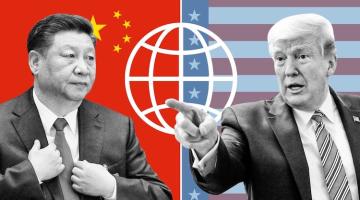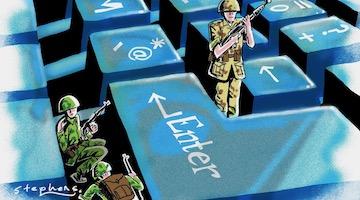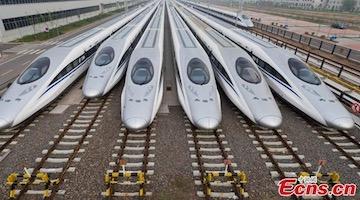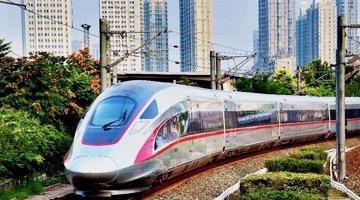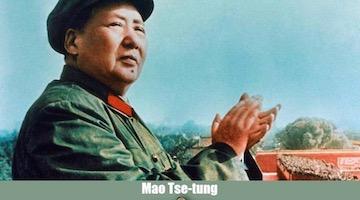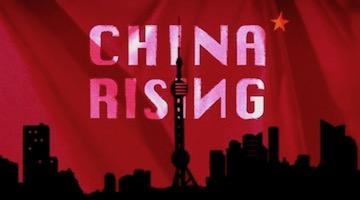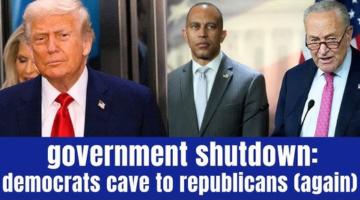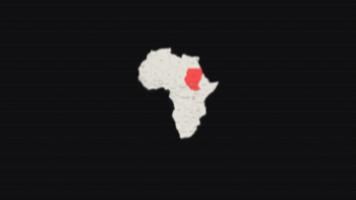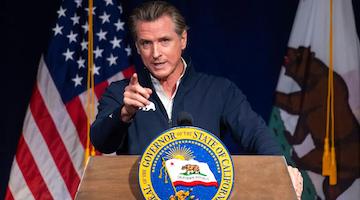Joe Biden and Donald Trump’s Anti-China Campaign Strategy is Part of a Broader Imperialist War Against China
Joe Biden and Donald Trump are taking aim at China to deflect attention away from the American nightmare.
“It has always been wrong-headed see China and the U.S. as equal partners in a broader war on the working class.”
The U.S. and Western Left has rarely been a friend of China. As arguably the most successful of the socialist revolutions of the 20thcentury, China is also a country with 1.4 billion people of a non-white hue. The combination of centuries of white supremacist ideological conditioning and at least one hundred years of military, cultural, and economic warfare against socialism has firmly placed a large section of the U.S. and Western left in the anti-China camp. This poses a significant problem for humanity in the age of COVID-19. As the U.S. political class scrambles to cover up the social and economic collapse that COVID-19 has thoroughly exposed, Joe Biden and Donald Trump have kicked off their general election campaigns by taking aim at China to deflect attention away from the American nightmare.
Donald Trump made the first move with an attack ad on Biden that positioned Obama’s former Vice President as a friend of China’s rise, an obvious dog whistle to the notion that Democrats are the truest threat to the white man’s jobs. Biden came out with ads of his own that condemned Trump for praising China’s pandemic response and for claiming that the United States should “trust China.” It is clear that all sides of the U.S. ruling class are frantically seeking to blame China for the systemic failures exposed in the U.S. response to COVID-19. While China has largely contained the virus and is currently working on imported infections, the U.S. has been truly “exceptional” in terms of COVID-19 cases and deaths. So exceptional, in fact, that the crisis engendered by COVID-19’s rapid spread in the United States has given the ruling class added motivation to intensify its broader imperialist war against China. A leaked memo from the National Republican Senatorial Committee indicates that blaming China for the coronavirus crisis makes up a key aspect of the GOP agenda, and Biden and the Democrats possess a similar strategy.
“All sides of the U.S. ruling class are frantically seeking to blame China for the systemic failures exposed in the U.S. response to COVID-19.”
Rarely does the U.S. and Western left pay any attention to U.S. imperial aggression against China. Many socialist-leaning groups and publications choose to talk about China as a collaborator in the theft of “American” working class jobs and a thoroughly capitalist pariah state. These same forces have been silent about how COVID-19 has exposed their racist lies about China. If China were a capitalist state, then it would not have been able to mobilize its state-owned industries (which follow a plan devised by a 90 million strong Communist Party and the central government) to build two hospitals in less than ten days and redirect production so that the massive amounts of medical equipment demanded by the spread of COVID-19 at home and abroad were produced and distributed in no less rapid of a period. While China sends millions of masks, ventilators, testing kits, and medical experts to 120 countries around the world, U.S. imperialism continues its sanctions regime against Venezuela, Cuba, and Iran. U.S. imperialism has not ceased its engagement in “hot” wars in the Middle East, either, despite U.N. recommendations for a global ceasefire. The U.S. thirst for war far outweighs its concern for human existence and is the reason why Biden and Trump are making hostility toward China a central issue of the general election.
It has always been wrong-headed for U.S. and Western leftists to see China and the U.S. as equal partners in a broader war on the working class. China’s decision to open up its economy to capitalist markets under the guide of the central plan was made to spur technological development and thus take China out of the conditions of underdevelopment and poverty that had plagued the nation prior to the revolution. While poverty had been reduced under the largely agrarian-centric model of socialist development during the Mao-period, more progress was needed in the development of modern industry to truly raise the standard of living of the entire Chinese nation. The United States always saw China as a business opportunity and celebrated its decision to give capitalism a role in economic development. A long-period of low-wages and friendly tax policies surely hurt workers in the U.S., but it was U.S. corporations and political administrations that were dictating the conditions of U.S. workers, not China.
“The U.S. thirst for war far outweighs its concern for human existence.”
The friendliness of the U.S. toward China in the decades since normalization has always come with an asterisk. U.S. imperialism watched closely as China’s mixed economy of socialist planning with capitalist characteristics grew at rates beyond the stagnating West and with a completely different purpose. Toward the end of the Bush II administration and the beginning of the Obama administration, China was no longer just a business opportunity as living standards, including wages, grew in proportion to its economy. This scenario made China an existential threat to the future of U.S. imperial hegemony which had to be contained. U.S. imperialism devised a military and economic strategy that sought to isolate China economically and ensure that the Communist Party-led nation was fully aware of the U.S.’ military capabilities in the case of a “hot war.”
To actualize this strategy, former President Barack Obama’s administration put forward the Trans-Pacific Partnership (TPP) and the “Pivot to Asia.” The TPP sought to bring together twelve of the biggest and economically strategic countries across the Pacific under a regime of corporate governance. Signatories agreed to relinquish nearly all governing jurisdictions to investors, allow software corporations free reign to spy on participating governments, and grant firms even fewer restrictions to exploit the natural environment. The TPP was considered a free trade agreement, but it was really a policy of economic containment directed at China. While popular protest ensured that the TPP was never ratified, economic warfare against China continued under Trump’s so-called “trade war.” Unlike the TPP, the trade war attempted to intimidate China by placing costly tariffs on key imports to the United States. This policy hurt U.S. capitalists more than China and has been viewed unfavorably by a significant section of the lords of capital themselves.
The Pivot to Asia, however, has been a universally celebrated policy on the part of U.S. imperialism. This strategy centered on “rebalancing” the Pacific in favor of U.S. hegemony and at the expense of China. Around sixty percent of the U.S.’ military assets were deployed to the Pacific, with a special focus on naval capacity. Key countries such as South Korea, Japan, Australia, and the Philippines were provided American military bases, naval assets, F-35 fighter jets, and an assortment of war-time weaponry to station on China’s doorstep. The Trump administration has continued this policy of aggression toward China under the guise of “Great Power competition.”Just last week, the U.S. sent three warships partnered with Australian naval forces to further escalate tensions with China in the South China Sea region.
“The trade war hurt U.S. capitalists more than China.”
Make no mistake, all sides of the U.S. political class agree that China is an existential threat to the continued rule of finance and monopoly capital. Imperialism has been in a state of economic stagnation for decades. China’s push for a multipolar world has strengthened alongside its growing share of the global economy. In many ways, China is a more attractive partner than the United States or its imperial allies in the West. While imperialism demands that developing nations bow to the dictates of international finance and the private profits of foreign firms, China promotes a model of shared growth that privileges “win-win” cooperation. Instead of bombs and burdensome debt, China supports infrastructure projects and other key drivers of economic growth in exchange for natural resources needed to develop its own economy.
Now is the time to defend the sovereignty of China and learn from its COVID-19 response, not demonize the country on behalf of the racist and imperialist U.S. power structure. The opportunity to blame China for the crisis of COVID-19 is too attractive to pass up. Joe Biden has nothing to offer working class people and really no avenues to differentiate himself from Donald Trump other than “experience” and “civility.” As the COVID-19 pandemic continues to wreak havoc, Donald Trump’s seemingly formidable approval ratings have significantly diminished. COVID-19 has exposed the fundamental antagonism between capital and the exploited classes. The legitimacy of the entire system is on the line, and both political parties in the U.S. are committed to maintaining it by any means necessary.
“China supports infrastructure projects in exchange for natural resources.”
White supremacy renders much of the population vulnerable to cop consciousness. Cop consciousness is what makes many white leftists search for “bad actors” such as China to help them draw false equivalencies with their imperialist fatherland. In a moment when both political parties are foaming at the mouth to impress their crisis-ridden ruling class masters with acts of imperial aggression against China, anti-China racism becomes increasingly dangerous for the future of human life itself. It is easy to critique, blame, and shame China when the left possesses just as little to offer to the people as the imperialist system has to offer humanity. The combination of COVID-19 and the 2020 general election has thus created an ugly situation for the struggle for peace and socialism in the United States. The work from here is to expose the broader imperialist war behind Biden and Trump’s anti-China attacks and to make the end of hostilities with China part of a mass movement that demands the fulfillment of the basic material needs of the working class for healthcare, housing, education, living wages, and the dismantling of the mass incarceration and surveillance regime root and branch. This movement has yet to be born, but the imperatives of U.S. imperialism have impregnated the current epoch with possibility.
Danny Haiphong is an activist and journalist in the New York City area. He and Roberto Sirvent are co-authors of the book entitled American Exceptionalism and American Innocence: A People’s History of Fake News--From the Revolutionary War to the War on Terror (Skyhorse Publishing). He can be reached at wakeupriseup1990@gmail.com, on Twitter @spiritofho, and on Youtube at The Left Lens with Danny Haiphong.
COMMENTS?
Please join the conversation on Black Agenda Report's Facebook page at http://facebook.com/blackagendareport
Or, you can comment by emailing us at comments@blackagendareport.com

